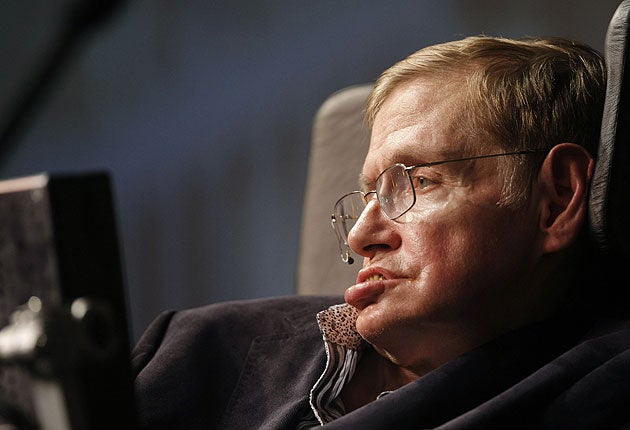Hawking in hospital with chest infection
'Very ill' cosmologist undergoes tests at Addenbrooke's

Stephen Hawking is in hospital with a chest infection that has made the wheelchair-bound scientist "very ill", a spokesman for Cambridge University said last night.
Professor Hawking, 67, has motor neurone disease and has been almost completely paralysed for years. An ambulance took him to Addenbrooke's Hospital in Cambridge at midday yesterday, where he underwent tests.
Colleagues said he had been ill for a couple of weeks but his condition had worsened since his return on the weekend from a trip to the United States.
A spokesman for the university said that Britain's best-known living scientist was "very ill". The hospital later issued a statement saying that he remained "comfortable" and was being kept in overnight for observation.
Professor Hawking is due to retire from his position as Lucasian Professor of Mathematics – a post once held by Sir Isaac Newton – later this year, although he is due to continue working at the university as an emeritus professor of mathematics.
He was born in Oxford and went to school in St Albans, Hertfordshire before returning to Oxford to study for his first degree. He was diagnosed with amyotrophic lateral sclerosis (ALS), the most common form of motor neurone disease, when he was aged 21 and a postgraduate student at Cambridge.
He expected that he would not have long to live and later said that he had been concerned about being able to finish his PhD thesis.
"Then suddenly, towards the end of my second year of research, things picked up. My disease wasn't progressing much and my work fell into place and I began to get somewhere," he said on his 60th birthday.
Professor Hawking's greatest popular success is his 1988 bestseller A Brief History of Time which attempts to explain the intricacies of cosmological theory, from Einstein's theories of relativity to the Big Bang, black holes and the end of time.
The popularity of the book and his paralysed condition, which involved him speaking through a voice synthesiser, has helped to make him a household name. He has appeared in television advertisements for BT and made a guest appearance on The Simpsons.
Much of his work has been focused on understanding the physics of black holes, super-dense structures in the cosmos which have such a strong field of gravity that nothing – not even light – escapes. He discovered that something would emit from the boundary or "event horizon" of a black hole. This became known as Hawking Radiation.
"At first, I thought this must be a mistake in my calculation. But what persuaded me that it was real was that the emission was exactly what was required to identify the area of the horizon, with the entropy of a black hole," he said in 2002. "I would like this simple formula to be on my tomb stone."
He has been treated for pneumonia in the past but there is nothing to indicate the chest infection has developed into the condition this time.
Professor Peter Haynes, the head of the applied mathematics department at Cambridge, said: "Professor Hawking is a remarkable colleague. We all hope he will be amongst us again soon."
Subscribe to Independent Premium to bookmark this article
Want to bookmark your favourite articles and stories to read or reference later? Start your Independent Premium subscription today.

Join our commenting forum
Join thought-provoking conversations, follow other Independent readers and see their replies